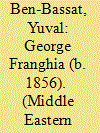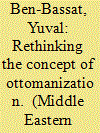|
|
|
Sort Order |
|
|
|
Items / Page
|
|
|
|
|
|
|
| Srl | Item |
| 1 |
ID:
192250


|
|
|
|
|
| Summary/Abstract |
This article traces the career of the Greek Orthodox Ottoman engineer George Franghia, who served for a decade and a half at the end of the nineteenth century as the engineer of the District of Jerusalem. Franghia, a brilliant and prolific engineer whose name has almost entirely disappeared from the annals of Late Ottoman Jerusalem, was responsible for numerous infrastructure projects, construction plans, and an ambitious vision for modernization which would have completely changed the nature of the city and District of Jerusalem had they been fully implemented. It presents his achievements, and the vicissitudes of his lengthy career, which eventually led him to serve the central Ottoman authorities in Istanbul including the Sultan himself, despite being involved in numerous other initiatives in Jerusalem, both private and public.
|
|
|
|
|
|
|
|
|
|
|
|
|
|
|
|
| 2 |
ID:
087017


|
|
|
|
|
| Publication |
2009.
|
| Summary/Abstract |
Based on rarely used documents from archives in Israel and Turkey, this article offers a new approach for the study of proto-Zionist-Arab relationships in Palestine at the end of the nineteenth century. It foregrounds the regional and sociological dimensions of the encounters between the two populations through focus on the Judean colonies southeast of Jaffa. These colonies, located relatively close together, maintained a close-knit network of mutual exchanges and gradually crystallized into a "bloc". Using a bottom-up approach, the article explores the developing coordination between the colonies and its impact on their relationships with their Arab neighbors. By the early twentieth century, the author argues, a distinct sociocultural identity had developed in the colonies and the close cooperation had begun to take on a nationalist coloration.
|
|
|
|
|
|
|
|
|
|
|
|
|
|
|
|
| 3 |
ID:
089121


|
|
|
|
|
| Publication |
2009.
|
| Summary/Abstract |
An examination of the diverse Hebrew newspapers published in Palestine in the aftermath of the Young Turk Revolution of 1908 teaches us a great deal about the complexity of the term Ottomanism, which was interpreted differently by the Empire and the minorities remaining within its shrinking borders. Whereas the Empire officially perceived Ottomanism as a new form of hybrid identity which would substitute existing national identities, the yishuv's various sectors envisioned a decentralized empire under the house of Osman. In this sense, the Revolution encouraged the emergence of a shared national vision among many circles in the yishuv, although each group still strove to shape the character of the Zionist community in Palestine according to its own agenda.
|
|
|
|
|
|
|
|
|
|
|
|
|
|
|
|
| 4 |
ID:
159227


|
|
|
|
|
| Summary/Abstract |
This article compares the evacuations of the two port cities of Gaza and Jaffa in southern and central Palestine, respectively, by their civilian population on the orders of Cemal Pasha, the Ottoman commander of the Syrian front, during the spring of 1917. While these evacuations are usually regarded as mutually exclusive events, they were in fact part of the same process. We claim that the general evacuation order for two of the main coastal cities of Palestine was driven by the exigency of war and military considerations, rather than by political motivations such as the desire to destroy Zionism or take revenge against the Arab population. This view does not negate the exceptionality of each case but rather aims to better contextualize them within the larger framework of civilian affairs in the region and the Empire at large during WWI. For this purpose we analyse a 17-page enciphered Ottoman telegram that sheds new light on the rationale and the execution of the evacuation of populations in Palestine and compare it to other controversial events in Greater Syria during the war.
|
|
|
|
|
|
|
|
|
|
|
|
|
|
|
|
| 5 |
ID:
145804


|
|
|
|
|
| Summary/Abstract |
The article deals with the Zarnuqa incident which took place on 23 July 1913 between the colonists and guards of Rehovot, and the Arab rural population in their vicinity, an incident which is considered by historians as a milestone in Zionist–Arab relations in late Ottoman Palestine. The aim of the article is to present the various narratives available to researchers today, starting with the various Jewish sources, then examining the Arabic sources and, finally, external ones. We analyse each of the sources and draw general conclusions about the sources historians can use today when studying this formative period of Zionist–Arab early encounters. The decision to examine several different narratives provides a multidimensional perspective on the event. Our aim is not to determine whose narrative is closer to historical reality (which would certainly be elusive), or to find out who started the fight and who is to be blamed but rather to present the different narratives, how each side described the event, and what the narrators chose to emphasize and what to omit. The article illustrates the difficult task facing historians dealing with late Ottoman Palestine, the period of the early Zionist–Arab encounter and conflict.
|
|
|
|
|
|
|
|
|
|
|
|
|
|
|
|
|
|
|
|
|